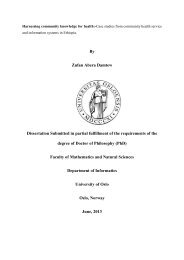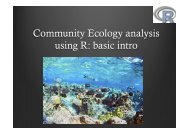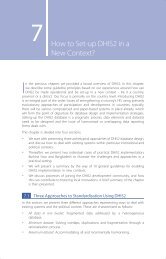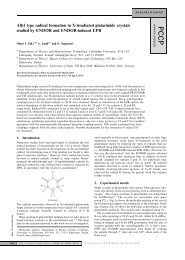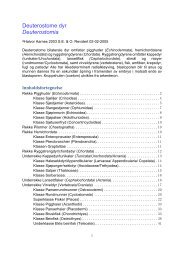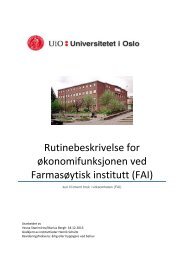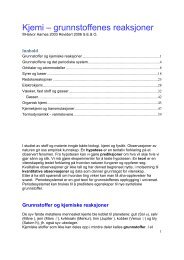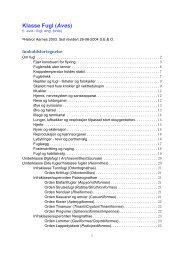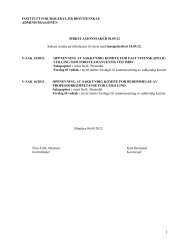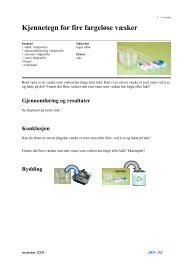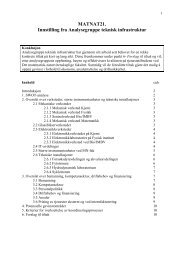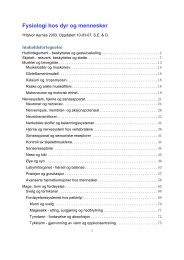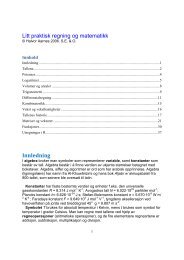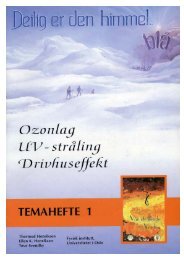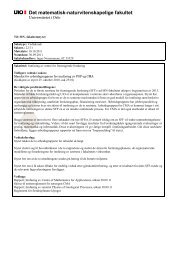Evaluation of individual research units - Norges forskningsråd
Evaluation of individual research units - Norges forskningsråd
Evaluation of individual research units - Norges forskningsråd
You also want an ePaper? Increase the reach of your titles
YUMPU automatically turns print PDFs into web optimized ePapers that Google loves.
<strong>Evaluation</strong> <strong>of</strong> biology, medicine and health <strong>research</strong> in Norway (2011)<br />
iii) Develop stronger links with <strong>research</strong>ers at other Norwegian universities. This target<br />
was partially met with the faculty reorganisation.<br />
iv) Develop a more focused <strong>research</strong> direction for the faculty. This goal was achieved<br />
by the reorganisation.<br />
<strong>Evaluation</strong> <strong>of</strong> <strong>individual</strong> <strong>research</strong> <strong>units</strong><br />
Aquatic Animal Health<br />
Grading <strong>of</strong> scientific quality<br />
Very Good<br />
Description <strong>of</strong> unit<br />
The Aquatic Animal Health unit conducts <strong>research</strong> on fish-health management practices<br />
in the Atlantic salmon and cod aquaculture industries. In particular, the group examines<br />
the effects <strong>of</strong> stress on the fish immune system and other aspects <strong>of</strong> fish health, fishpathogen-environment<br />
interactions, and diagnostics. The group is staffed by two<br />
principal scientists, two senior scientists, one postdoctoral fellow, two technicians and, at<br />
the time <strong>of</strong> this assessment, seven PhD students. The staff come from diverse countries<br />
and most are male. Funding has been solid in recent years, but the group is dependent on<br />
both industry contracts and competitive grants and is therefore affected by the economics<br />
<strong>of</strong> the aquaculture industry.<br />
General evaluation & recommendations<br />
This unit is a solid contributor to the faculty. The strategic recruitment <strong>of</strong> international<br />
expertise in aquatic animal health is a major reason for the initial success <strong>of</strong> the program.<br />
As result the unit has several international collaborative projects and many industrydriven<br />
projects, supported by an excellent wet-lab. There is a favourable ratio <strong>of</strong> PhD<br />
students to <strong>research</strong>ers, particularly given that the PhD program was only approved in<br />
2009.<br />
At present the unit has a low proportion <strong>of</strong> Norwegian PhD students, which could affect<br />
the unit’s ability to secure funding from the Research Council and other national or local<br />
sources. It may be helpful to conduct outreach to ensure potential graduate students in<br />
Norway are aware <strong>of</strong> the Aquatic Animal Health Group. The range <strong>of</strong> <strong>research</strong> topics<br />
currently being pursued is broad given the number <strong>of</strong> staff and their expertise, and may<br />
lead to a reduction in <strong>research</strong> quality. The <strong>research</strong> in a high proportion <strong>of</strong> publications<br />
was completed elsewhere. We were surprised there are no staff who are clinical<br />
veterinary pr<strong>of</strong>essionals, and thought although the group has access to veterinary<br />
consultation it might be useful to add this expertise.<br />
We <strong>of</strong>fer four suggestions: (i) reach out to Norwegian and other Scandinavian students as<br />
potential PhD candidates, (ii) hire an additional faculty member with a background in<br />
clinical veterinary medicine, (iii) narrow the primary <strong>research</strong> areas and concentrate on<br />
topics that complement the expertise <strong>of</strong> current staff, and (iv) consider merging or<br />
expanding some <strong>research</strong> groups, as described below.<br />
41



